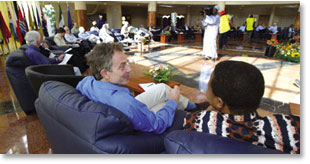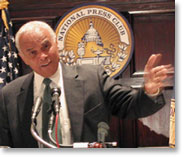- Letters from Leonard Peltier – reminder of genocide against Indians
- Black genocide: From the cradle to the grave
- Genocide of Blacks continues in America
- One on one with Dr. Frances Cress Welsing
- Bush named in ‘genocide complaint

WASHINGTON (FinalCall.com) – Great danger lies ahead for Africa in the future, according to leaders of TransAfrica, one of this country’s oldest and most influential Africa-interest organizations.
In the face of the AIDS pandemic, wars, famine and drought, it is possible that the African continent and Black people around the world have become targets of a genocide conspiracy by Europeans, said folk singer Harry Belafonte and Bill Fletcher, president of TransAfrica, to reporters Dec. 8.
“This administration truly believes that the world breaks down into right-or-wrong, and right is their way and wrong is any other way,” said Mr. Fletcher.
“When you have that type of intense, ideologically driven arrogance, the future of the planet is really at stake,” Mr. Fletcher warned.
“Much has been written and much has yet to be written about the decolonization in Africa,” TransAfrica Board member Harry Belafonte said. Most of the nations of Africa have become independent, but once the colonizers left the continent, what they left behind was their continuing control of the economy and their continuing control of the governance of those countries, said Mr. Belafonte, in response to a question from The Final Call.
“Whenever nations grew and came to a position where they would be independent or not in harmony with what (the U.S.) thought the policy should be, we would then move to dismantle, overthrow and feed into the destabilization of (those) nations on the continent of Africa,” he added.
When the first African nations won their independence, they created the OAU, the Organization of African Unity. In the early days of the OAU, Mr. Belafonte said, the Cold War got in the way of African development. “Between the KGB and the CIA using Africa as a playground, very little of what was set as the hopes and the goals of Africa to achieve ever had a chance to see the light of day.”
The new group of 21st Century African leaders dissolved the OAU to form the African Union (AU). Their goal was to find new ways to deal with old issues. These newly independent nations have begun to move more independently from the old U.S. ideas that were never fulfilled, said the successful singer and actor.
Another important new development that Mr. Belafonte cheers has been the decision by the AU’s leadership to find a serious place at the table for the voices of the African Diaspora.

The United States, he continued, has a large Black population, but Blacks in this country “somehow don’t have a voice in the affairs of Africa, because we come under a sovereign state. We are Americans and our government is primarily driven by people and institutions that are non-Africans.”
But a senior administration official defended U.S. policies in Africa, including the high visibility appointment of former Secretary of State James Baker as “Debt Ambassador” trying to get countries to forgive the debt of Iraq, while saying very little about African debt relief.
“The United States, under President Bush, has actually been very supportive of debt relief in the poorest countries. So, we are one of the participants in HIPC–highly indebted countries, and have been aggressive in that,” the official told Black reporters at the White House Dec. 9 in response to a question from The Final Call.
“We have, with all of these countries–and I hope it will be true with Iraq, too–when you start restructuring and relieving debt, you want to make sure you’re getting reforms that mean that you don’t just end up with another highly indebted situation 10 or 15 years down the road.”
President George W. Bush has had an “active Africa agenda, when you look at the AIDS initiative, when you look at the Millennium Challenge Account initiative, which will benefit Africa heavily, when you look at the efforts that he has made in the Democratic Republic of the Congo.
“You look at what we’ve done in Liberia, if you look at what is happening in Sudan, as my Russian friends used to say, it’s no accident, comrade. The President very early on set out to try to do something about the civil conflicts that are wrecking Africa, because debt relief is important, development assistance is important, AIDS relief is important. But as long as you have raging civil wars, none of it is going to have a real impact.
“So, we’ve had really a two-pronged strategy, which is to work on the development assistance side, the debt relief and AIDS, but also to work actively to try to end some of these persistent conflicts.
TransAfrica President Bill Fletcher agrees with Mr. Belafonte, however. “There’s something very ominous that has been happening over the last 15 years,” he warned, “not just in Africa, where we’re moving in a direction where global capital is less concerned about state structures, and more concerned about developing the equivalent of protectorates and treaty ports for the 21st Century.
“The example I would give is the lack of concern about Somalia by the United States,” Mr. Fletcher continued. “What has been important is making sure that oil operations in Somalia can continue. You have like an almost feudal arrangement where a company, as long as it can guarantee protection, which is largely through paying off warlords, or creating armies of mercenaries, they can continue their operations and are less concerned about the need for a state.
“My worry is that we’re going to see more and more of that in Africa,” said Mr. Fletcher. “Africa is being eaten away, much as the way scavengers pick over a carcass. We can see that, as other countries where multi-national corporations will be taking over sections of territories or industries themselves, there will be less concern about whether or not (an individual country) survives as a nation state, but more concern about whether or not the corporate interests there are protected. That is a great danger in our future.”












